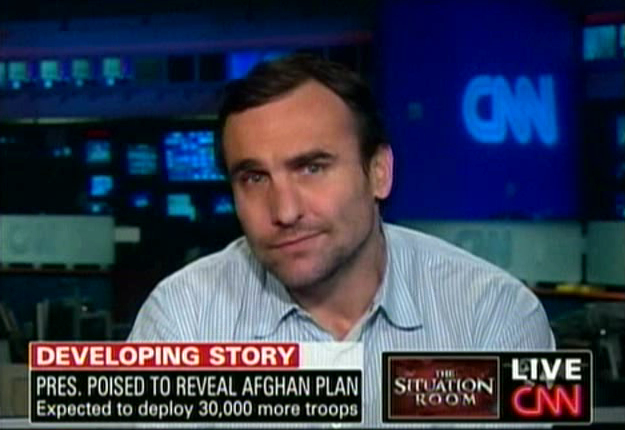TSR: "You cannot possibly cover all of Afghanistan. So you need to pick your targets."
Monday, November 30, 2009

Length: 4:56
LARGE (57.4 MB) ----- SMALL (6.0 MB)
On the eve of the presidential address to reveal the new plan for Afghanistan, Wolf Blitzer talks to Michael (in NY) and Peter Bergen (in DC) about what we need to accomplish in order to get our troops out.
WOLF BLITZER: We're just over 24 hours away from President Obama's huge announcement on his new Afghan strategy, expected to include at least 30,000 additional U.S. forces being deployed to Afghanistan.
CNN's national security analyst Peter Bergen and CNN's Michael Ware, they're both here to discuss whether or not the strategy might work.
Michael, you've spent a lot of time in Afghanistan. Another 30,000 or 35,000 U.S. troops. Is it going to get the job done?
MICHAEL WARE, CNN CORRESPONDENT: Well, it depends entirely on how they're used, Wolf. I mean it's what the focus is going to be. You cannot possibly cover all of Afghanistan. So you need to pick your targets. And principally, the Taliban war machine, by and large, remains untouched, despite the troops who are already there.
Despite the operations in Helmand Province where the Marines have been sent, their ability to recruit, their ability to supply, their command and control remains intact. So how we're going to use these 30,000, where are we going to send them, and at the end of the day, Wolf, they're still not going to be enough.
We need an Afghan partner within the government. And I think we need Afghan partners beyond the government -- Wolf.
BLITZER: He's got a lot of explaining, Peter, to do tomorrow night, the president, if he's going to convince the American public that this is the right thing to do.
PETER BERGEN, CNN NATIONAL SECURITY ANALYST: Yeah. In the speech he gave on March 27th, he said it was really about disrupting, dismantling al Qaeda. I suspect in the speech that he will give shortly, he'll expand on that and say that there are some other values. We don't want the Taliban returning, that would be a strategic defeat for the United States and for NATO and Afghanistan. We're concerned about the stability of Pakistan, and an unstable Afghanistan helps to make an unstable Pakistan, a country of nuclear weapons. We have a moral obligation to kind of get it right in Afghanistan, having overthrown their government. There are a lot of other things he could say.
BLITZER: Peter, there's a lot more al Qaeda -- forget about the Taliban for a moment -- a lot more al Qaeda in Pakistan. And maybe even more al Qaeda in Somalia or Yemen than in Afghanistan.
BERGEN: Certainly. But you know, the Afghan/Pakistan border doesn't really exists -- you know, it exist on a map but it doesn't exist for al Qaeda or the Taliban. And the 82nd Airborne can't go in to Pakistan because of the politics on that side of the border. So, you know, we're trying to prevent the Taliban expanding even more back into Afghanistan than they are already.
BLITZER: What will this exit strategy, Michael -- the president supposedly is going to talk about an exit strategy down the road. We know the Taliban, they've had others who have come in over the years and tried to deal with Afghanistan, like the Russians, for example.
If the U.S. is going to stay five or 10 years, to them it doesn't necessarily seem like a long time.
WARE: Well, no, it's not. As you know, Wolf, the Taliban fight generationally. They fought the Soviets for 10 years. They fought every other occupier/invader before that as history tells us.
Bottom line, with American military might, you are not going to defeat the Taliban. It's their home soil. The terrain is against us. We don't have the troops. The people are scared. There's a weak and corrupt central government that does not give the villages any confidence.
The best that you can hope for is to put the hurt on the Taliban militarily. Make them feel the American military presence. And that hopefully will parlay to a political deal because ultimately that's going to be the only solution.
And as Ambassador Holbrooke, the president's special envoy to the region, has said, Hamid Karzai, the president of Afghanistan, has already been in direct talks and indirect talks with the Taliban. So there's going to have to be an accommodation of some sort before America can come home.
BLITZER: Can the U.S. buy off the Taliban in Afghanistan sort of the way the U.S. bought off the Sunni insurgents in the Al Anbar Province in Iraq?
BERGEN: Actually in the Defense Appropriations Bill, there's a substantial amount of money to do precisely that and certainly at the lower and even the mid level, you can do that with the Taliban. In fact, there already has been an amnesty program for the Taliban over the last several years that several thousand Taliban, lower level members, have taken advantage of. The recidivism rate has been very low.
It's a whole lot other question about doing a deal with Mullah Omar. He's repeatedly said that he's not interested in a deal. And in fact, he's just come out with a recent message making that same point.
BLITZER: We're going to have a lot more on this tomorrow. Both you guys are going to be with us tomorrow night for our special coverage. That will begin at 7:00 p.m. Eastern.
Peter Bergen, Michael Ware, guys, thanks very much.
